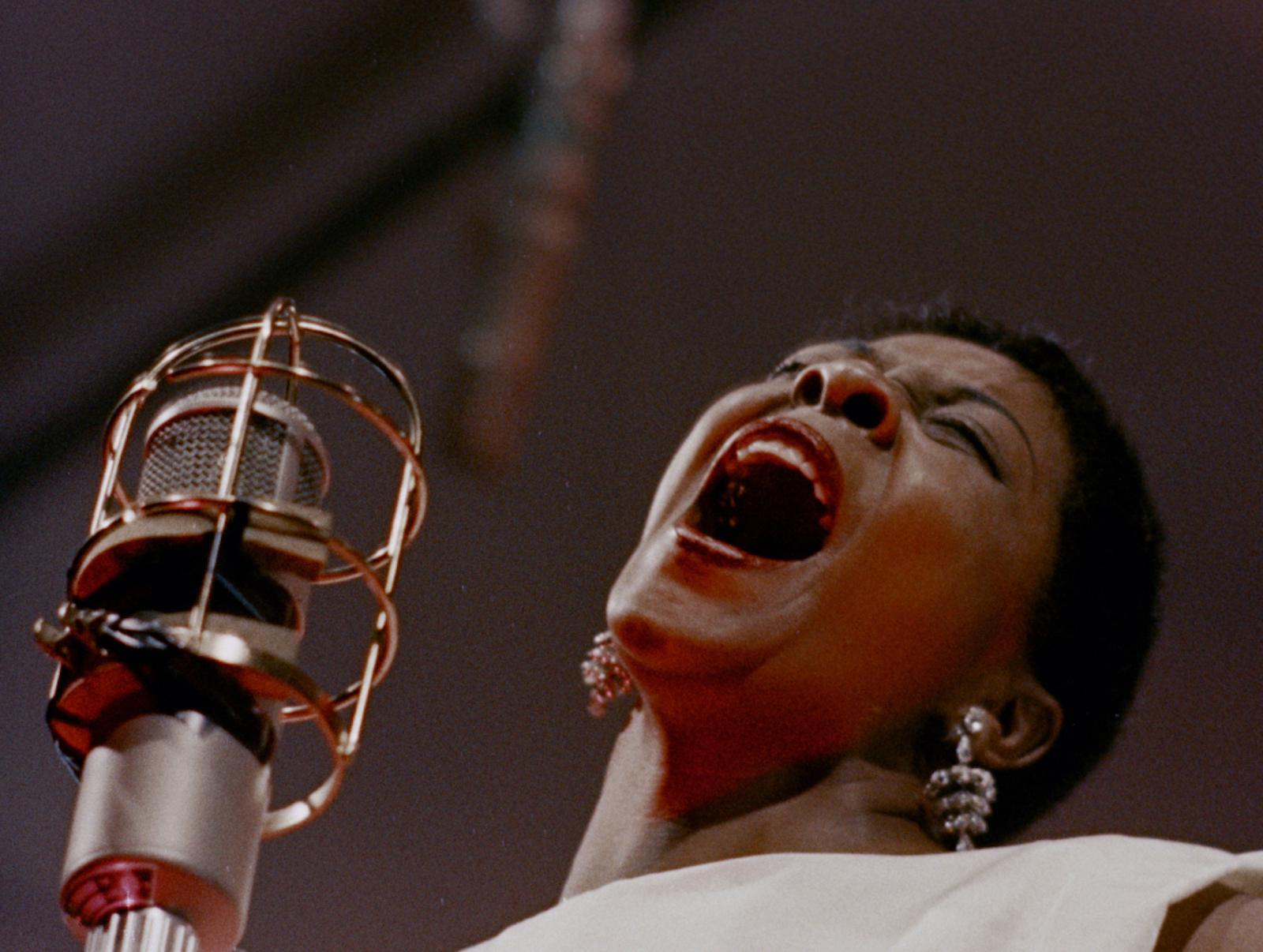Bert Stern’s Jazz on a Summer’s Day, streaming from Film Forum starting August 12, transports us to a simpler time when bare-faced citizens might assemble en masse to listen and dance to American music. One of the earliest music documentaries, Stern’s film records a number of performers from the 1958 Newport Jazz Festival, periodically cutting away to the sailboat activities in the town harbor.
The music is mainstream even by 1958 standards (Stern did not deign to document Miles Davis or John Coltrane, and Thelonious Monk is cut to a bare minimum). Still, Jazz on a Summer’s Day does conjure a peaceable kingdom—young and old, black and white, hip and square, rich and less rich—presided over by the most benign of founding fathers, Louis Armstrong, whose influence is evident on virtually all of the artists.
Armstrong notwithstanding, the movie is anchored by its female vocalists: Anita O’Day, Dinah Washington (demonstrating her vibraphonic chops), the R&B powerhouse Big Maybelle (incongruously done up like a prom queen), and gospel legend Mahalia Jackson. Jackson provides a suitably formidable closer with “The Lord’s Prayer,” but the movie peaks early with O’Day’s stoned version of “Sweet Georgia Brown” and rapid-fire scatting on “Tea for Two.” Like Big Maybelle, she’s dressed for the occasion in a spectacular feathered sunhat and white gloves, riffing on the gentility of this lost American idyll.
*
More virtual summer is provided by the Criterion Channel, which is streaming its comprehensive collection of Olympic films from Stockholm 1912 to London 2012. The combined 100 or so hours could easily fill a month of viewing, but the one documentary to see is Kon Ichikawa’s Tokyo Olympiad.
Billed as “the sensation of the century,” the 1964 Tokyo games were—and are—fraught with historical significance. The 1940 Olympics, the first to be held in Asia, were scheduled for Tokyo and canceled by World War II; the 2020 Tokyo Olympics have been canceled by Covid-19. Ichikawa’s movie is not only exciting but excited in documenting how the new world of 1964—which includes decolonized Africa, not to mention Cuba and Vietnam—has come to rebuilt, revitalized, ultra-modern Japan. As a director, Ichikawa is unafraid of chaos, particularly in the movie’s first half, when crowds throng the stadium and athletes relax in the Olympic Village; as a film, Tokyo Olympiad is suffused with the mid-Sixties Pop Art “now futurism” of Antonioni’s Red Desert or De Broca’s That Man from Rio.
The most notorious Olympic film is, of course, Leni Riefenstahl’s two-part Olympia, an aggrandizing spectacle of the 1936 Olympics. The Nazis recognized early the games’ propaganda potential and greatly heightened their ritual flavor. (The Berlin Olympics introduced the ceremonial torch run and popularized the five-ring logo, specially carved into a Greek stone altar to produce an instant pseudo-classical ruin.) Inventing the whole Wide World of Sports iconography that is still with us today, Riefenstahl had thirty-six cameras at her disposal, as well as steel towers built to her specifications for use in filming the games.
Based on total access, Riefenstahl’s filmmaking can be brilliantly duplicitous. Retakes, studio shots, stand-ins, and inserts make the marathon race a model of creative editing, not to mention bombastic kitsch. Speaking of which, the Olympics’ other great nationalistic pageant—namely, Zhang Yimou’s stupendous opening ceremony for the 2008 Beijing games—falls beyond Criterion’s purview (although elements of it do feature in Gu Jun’s The Everlasting Flame). Still, fragments can be found on YouTube and elsewhere.
*
Eric Rohmer was a director for all seasons, but late summer seemed to suit him best. (Indeed, for years, his American distributors released his films in August.) Metrograph, which has instituted “live” screening during the Covid-19 pandemic, initiates a mini-Rohmer fest on September 4 with Rohmer admirer Noah Baumbach introducing Boyfriends and Girlfriends (1987). The Aviator’s Wife (1981) and Four Adventures of Reinette and Mirabelle (1987) are set to follow, in new digital restorations.
For good old summer vibes however, I recommend the most louche (relatively speaking) of Rohmer’s talkathons: Pauline at the Beach (1983), available from Amazon Prime and elsewhere. Closer to an Annette Funicello–Frankie Avalon vehicle like William Asher’s 1965 teen comedy Beach Blanket Bingo than serious Rohmerians might care to admit, Pauline is immeasurably helped by the fact that its youthful principals are often wearing next to nothing. French bedroom farce stripped down to its essentials.




